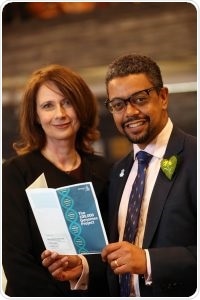Wales has joined the 100,000 Genomes Project, the Welsh Government announced today. The project, now a UK-wide initiative, seeks to transform patient care, encourage genomic discovery and drive a thriving genomics sector.

Dr Jayne Spink, Chief Executive, Genetic Alliance UK and Vaughan Gething AM, Cabinet Secretary for Health and Social Services. Photo credit: Micheal Hall/Genetic Alliance UK.
In an agreement between Cardiff and Vale University Health Board (CVUHB), Cardiff University and Genomics England (the company leading the Project across the UK), 420 whole genome sequences (WGS) have been commissioned for patients with rare diseases and their families, in Wales.
The 100,000 Genomes Project aims to sequence 100,000 genomes from 70,000 people with rare diseases and their families, as well as those
with cancer. To date, almost 50,000 whole genomes have been sequenced, with the ultimate 100,000 WGS milestone due to be reached by the end of 2018.
Welsh rare disease patients and their families, who choose to participate in the 100,000 Genomes Project, may be provided with a diagnosis and spared years of uncertainty and distress (often known as the diagnostic odyssey). With more precise and rapid diagnosis, there is also the potential to reduce pressure on Welsh health and social care budgets.
Today’s announcement brings together the Welsh Government, AWMGS, CVUHB, Cardiff University, the Wales Gene Park, the Medical Research Council (MRC) and Genomics England to establish the first Genomic Medicine Centre (GMC) in Wales. This joins 13 other NHS GMCs in England, the Northern Ireland GMC and the Scottish Genomes Project. The Wales GMC, based at the University Hospital of Wales site in Cardiff, has been supported by the Welsh Government and the MRC, which contributed £2.4 million and £1 million in funding respectively.
Participation in the 100,000 Genomes Project supports the Welsh Government’s ‘Genomics for Precision Medicine Strategy’, which sets ambitious goals for genomic medicine, including the development of:
- internationally recognized medical and public health genetics services;
- internationally recognized research in genomics and excellent platforms for precision medicine;
- new strategic partnerships in genomics and precision medicine; and
- the NHS and research workforce to underpin the delivery of genomic medicine.
Professor Mark Caulfield, Genomics England Chief Scientist, said:
Genomics is transforming healthcare and our ability to diagnose and treat rare disease and cancer. In joining the rare disease program of the 100,000 Genomes Project, Wales has placed itself at the center of genomic medicine revolution that will greatly improve patient outcomes, encourage exciting new discoveries and drive a world leading genomics industry.
Health Secretary, Vaughan Gething said:
We are delighted that Wales has joined the 100,000 Genomes Project. The collaboration with Genomics England will enable patients with rare diseases in Wales to benefit from this exciting and transformational project, with the potential to bring quicker and more accurate diagnoses.
The Director of the Division of Cancer and Genetics at Cardiff University School of Medicine and Honorary Consultant in Clinical Genetics with Cardiff and Vale University Health Board, Professor Julian Sampson, who leads the project in Wales, said:
Patients in Wales with rare conditions in whom routine testing failed to make a diagnosis now have a chance to access the most comprehensive genetic test available; sequencing of their entire genome. This will increase the chances of achieving a specific diagnosis to inform their health care. Wales’ participation in this UK-wide project is helping to establish genomic medicine in the NHS.
This will have far-reaching benefits for the understanding, diagnosis and treatment of many conditions.
Chief Scientific Advisor for Health, Dr Rob Orford said:
A key component of the Welsh Government’s Genomics for Precision Medicine Strategy is the creation of the collaborative Genomic Medicine Centre (GMC). The GMC will act as a springboard for the translation of cutting edge genomic research into better services and treatments for people of Wales.
Dr Nathan Richardson, head of molecular and cellular medicine at the MRC, said:
We welcome these very exciting developments that will help to establish a strong Wales-England partnership, which brings together patient genomes to enhance our ability to tackle the biggest challenges in understanding the role of human genetics in disease. We are excited by the prospects of people in Wales – and throughout the UK – who are affected by a rare condition and will benefit hugely from a new era of genomic medicine.